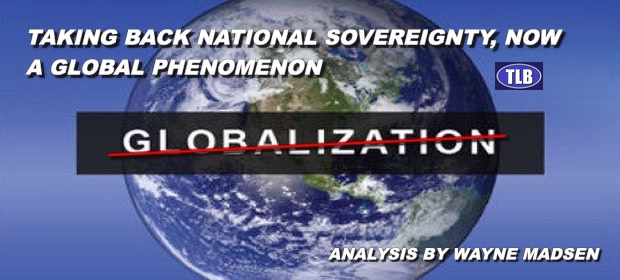
The march to GLEXIT – Globalization Exit
WAYNE MADSEN
The world, through the ballot box, is speaking out. From the British «Yes» vote on BREXIT – the United Kingdom’s exit from the European Union – to the election of the anti-globalization Donald Trump as president of the United States, the world is speaking out against the homogenization of the world into a super-state of blurred and overlapping governments, cultural identities, religions, and politics. The U.S. presidential election was not so much an election as it was a referendum on globalization in all of its malignant manifestations: free trade, open borders, and subjugation of national sovereignty to amorphous international organizations.
From every continent, there is growing popular support for «exiting» international contrivances, from the European Union and International Criminal Court to the North Atlantic Treaty Organization (NATO) and even the United Nations.
 In August of this year, President Rodrigo Duterte (left) of the Philippines threatened to pull his country out of the UN in what was the first such threat by a UN member-state since Indonesian President Sukarno successfully withdrew his nation from the UN in 1965.
In August of this year, President Rodrigo Duterte (left) of the Philippines threatened to pull his country out of the UN in what was the first such threat by a UN member-state since Indonesian President Sukarno successfully withdrew his nation from the UN in 1965.
Proponents of economic and political globalization have not only been dealt heavy blows in the election of Trump in the United States and the success of the BREXIT vote in the United Kingdom, but also in the decision by South Africa and other African nations to withdraw from the International Criminal Court in The Hague. The international tribunal heavily-influenced by global hedge fund viper George Soros that is increasingly seen by Africa as the «International Caucasian Court» primarily targeting African leaders for war crimes prosecutions. In October of this year, South Africa joined Burundi and Gambia in announcing that it would leave the ICC. Ironically and embarrassingly, the ICC’s chief prosecutor, Fatou Bensouda, is from Gambia.
In 2015, South Africa was condemned by the usual collection of Soros-financed NGOs, including Human Rights Watch and Amnesty International, for not arresting President Omar al-Bashir of Sudan, previously indicted by the ICC, while he was on an official visit to South Africa. South Africa rejected the ICC’s interference in its internal affairs and this disgust for the court culminated in the recent decision to depart from the court.
A month later, Russia announced that it was withdrawing as a signatory to the 2000 Rome Treaty that established the ICC. After the November Asia-Pacific economic summit in Lima, Peru, Philippines President Duterte also announced his country would join Russia, South Africa, and others in leaving the ICC. Duterte said, «They are useless — those in the International Criminal [Court]. [Russia] withdrew. I might follow. Why? Only the small ones like us are battered». Other African nations are considering scrapping the ICC. They include Uganda, Kenya, and Namibia. In 2015, Namibian President Hage Geingob visited former Tanzanian president Jakaya Kikwete to urge him to follow Namibia’s lead and exit from the ICC. At a summit of the African Union in South Africa, Geingob said, «Some people are saying we are the ones who created the ICC. However, when one creates something to be an asset but later on it becomes an abomination, you have the right to quit it since it has ceased serving its intended purpose».
 The BREXIT and Trump victories have emboldened electorates in many other nations to reject contrivances that stymie national sovereign rights. December 4, 2016 represents a watershed date to reject globalist agendas. It is the date of the re-run of the Austrian presidential election of April 24, 2016, one in which the anti-EU candidate of the Austrian Freedom Party, Norbert Hofer (right), was narrowly defeated by pro-EU Alexander van der Bellen of the Green Party. It turned out that 77,900 absentee ballots were miscounted in what represented a typical Soros-manipulated election. The Constitutional Court of Austria ordered a new election. The outcome of the December 4 election is believed by pollsters to heavily favor Hofer, as Austria has been caught up in the anti-EU groundswell rippling through Europe. December 4 is also the date of the Italian constitutional change referendum.
The BREXIT and Trump victories have emboldened electorates in many other nations to reject contrivances that stymie national sovereign rights. December 4, 2016 represents a watershed date to reject globalist agendas. It is the date of the re-run of the Austrian presidential election of April 24, 2016, one in which the anti-EU candidate of the Austrian Freedom Party, Norbert Hofer (right), was narrowly defeated by pro-EU Alexander van der Bellen of the Green Party. It turned out that 77,900 absentee ballots were miscounted in what represented a typical Soros-manipulated election. The Constitutional Court of Austria ordered a new election. The outcome of the December 4 election is believed by pollsters to heavily favor Hofer, as Austria has been caught up in the anti-EU groundswell rippling through Europe. December 4 is also the date of the Italian constitutional change referendum.
 Italian Prime Minister Matteo Renzi (left) has staked his political future on the referendum, which if passed, will reduce the power of the Italian upper house of parliament, the Senate, and drastically cut back the powers of the Italian regions. Renzi has tapped support for his referendum from the usual collection of those who do not represent the common people – members of the glitterati of the elite, such as actors, singers, celebrity chefs, professional athletes, film directors, and other diversionary leeches on society. The campaign for Montenegro to join NATO, backed by Soros- and CIA-funded propagandists, saw Montenegrin actors, journalists, and professional athletes appearing on television commercials urging NATO membership for the country even as many polls showed majority opposition to joining the military alliance.
Italian Prime Minister Matteo Renzi (left) has staked his political future on the referendum, which if passed, will reduce the power of the Italian upper house of parliament, the Senate, and drastically cut back the powers of the Italian regions. Renzi has tapped support for his referendum from the usual collection of those who do not represent the common people – members of the glitterati of the elite, such as actors, singers, celebrity chefs, professional athletes, film directors, and other diversionary leeches on society. The campaign for Montenegro to join NATO, backed by Soros- and CIA-funded propagandists, saw Montenegrin actors, journalists, and professional athletes appearing on television commercials urging NATO membership for the country even as many polls showed majority opposition to joining the military alliance.
Renzi, a supporter of the EU and global integration, said he will resign if his referendum fails. And fail it is expected to do as «No» voters are far ahead in opinion polls. December 4 may very well go down in history along with June 24, 2016 and November 8, 2016 – the respective dates of BREXIT and trump’s election – as a red-letter day when voters rejected globalization. Renzi will soon join other discredited globalists, including former British Prime Ministers Tony Blair and David Cameron, former Belgian Prime Minister Guy Verhofstadt, French President Francois Hollande, and German Chancellor Angela Merkel as footnotes in a failed history of international integration.
 Another important date for GLEXIT was November 13. With the globalists’ world still shaken from the election of Trump on November 8 came word that the pro-Russian former MiG pilot Rumen Radev (left), a political novice, won the Bulgarian presidential election. The election resulted in the resignation of Bulgaria’s pro-EU government. The same day, voters in Moldova elected Igor Dodon, who rejected a Moldova-EU trade agreement and favored joining the Eurasian Economic Union championed by Russia. The two elections in countries where Soros has infiltrated so much of the media and political infrastructures with pro-EU and pro-NATO acolytes were historic and another indication that the world was rejecting globalization.
Another important date for GLEXIT was November 13. With the globalists’ world still shaken from the election of Trump on November 8 came word that the pro-Russian former MiG pilot Rumen Radev (left), a political novice, won the Bulgarian presidential election. The election resulted in the resignation of Bulgaria’s pro-EU government. The same day, voters in Moldova elected Igor Dodon, who rejected a Moldova-EU trade agreement and favored joining the Eurasian Economic Union championed by Russia. The two elections in countries where Soros has infiltrated so much of the media and political infrastructures with pro-EU and pro-NATO acolytes were historic and another indication that the world was rejecting globalization.
In addition to the EU, NATO, and the ICC, other regional globalist-oriented organizations are also teetering on permanent disruption. The South Asian Association for Regional Cooperation (SAARC) has split along pro-Indian and pro-Pakistani lines. A recent SAARC summit in Pakistan was canceled after India refused to attend. India was soon joined by its allies, Bangladesh, Bhutan, and Afghanistan. The organization appears to be permanently split, with the other SAARC members of Maldives, Sri Lanka, and Nepal opposing India and generally aligning with Pakistan. Another failed international organization, the Arab League, is a vassal of Saudi and Gulf money and showed its worthlessness in 2011 when it suspended Syria and Libya as members after they were faced with NATO-backed jihadist revolutions. The League also grants membership to the Saudi puppet government of Yemen.
Mirroring the withdrawal of African states from the ICC, Venezuela in 2013 announced its withdrawal from the heavily U.S.-influenced Inter-American Convention on Human Rights (IACHR), a contrivance of the Organization of American States based in Washington, DC next to the White House. Venezuela’s withdrawal also rejected the jurisdiction of the Inter-American Court of Human Rights (CorteIDH) based in Costa Rica. The Dominican Republic withdrew from the court in 2014. Trinidad and Tobago admirably led the way in rejecting the so-called «Inter-American System», that is, American hegemony over the Western Hemisphere, when it withdrew from the IACHR in 1998. Criticism of the IACHR has come from Ecuador, Nicaragua, Colombia, and Peru.
The Commonwealth of Nations, an anachronistic leftover from the British Empire that cobbles together former British colonies into a group of British royal family sycophant nations, has seen Gambia, Maldives, and Zimbabwe leave the tacitly-worthless international organization.
Trump’s announcement that the U.S. would withdraw from the Trans-Pacific Partnership (TPP) also dealt a body blow to the globalization cause. TPP is dead with U.S. withdrawal. American rejection of TPP left other TPP signatories, such as New Zealand and South Korea, looking to expand trade agreements with China in a display of renewed preference for bilateralism over multilateralism. There is a «New World Order», but not one envisaged by the globalists. This New World Order is one of renewed national sovereignty, cultural and religious identity, and rejection of dictates from unelected international bureaucrats.
************
ER recommends other articles by Strategic Culture Foundation
About the author
Wayne Madsen is an investigative journalist, author and syndicated columnist. A member of the Society of Professional Journalists (SPJ) and the National Press Club
 Find out about our great (WOW) TLB Project Membership package and benefits, add your voice and help us to change the world!
Find out about our great (WOW) TLB Project Membership package and benefits, add your voice and help us to change the world!




